The ForgiveNest Podcast for A Course in Miracles Transcript: ACIM | Everyday Atonement - Partnering with the Holy Spirit in Your Healing, with Alison Anton
From A Course in Miracles, Jesus says, "It is possible even in this world to hear only that Voice and no other. It takes effort and great willingness to learn. It is the final lesson that I learned, and God’s Sons are as equal as learners as they are as Sons.” [ACIM CE T-5.II.12:1-3]
I'm Alison Anton. You're listening to the ForgiveNest Podcast for A Course in Miracles, your place to explore ACIM topics in healing, meditation, and your special function in forgiveness.
A Course in Miracles talks about how bodies and the ego are symptoms of a split mind that sees itself as separated from God. We call this split the separation. If you practice the Course, you're aware by now that the separation was clearly a mistake on our part.
And you're probably equally aware that it's not easily undone, at least for us. More like it's not easy to get us to agree to have it undone. The Holy Spirit is in charge of this undoing, otherwise known as the Atonement. But, for Him, it's already done. Easy peasy. For us? Well, herein lies the reason we have a tome of a book called A Course in Miracles.
Jesus even jokes that if we think it's going to take a miracle to accomplish what he's asking us to do, we're right.
Atonement and healing are essentially the same thing. Technically, atonement happens at once. When we accept the Atonement, we are healed. But, we obviously have to work our way up to that point through practice, lots and lots of practice.
How to do this? Well, pretty much every single workbook practice in the Course is a way to pave our way toward atonement. This preparation involves being open to having the blocks we placed in our mind removed. These are the blocks that keep us from wanting to be healed.
Now, it's hard to believe sometimes, but we don't actually want to be healed. If we really did, we would be. We'd rather keep the blocks in place, thank you, and carry on with the ego's status quo. But, as we plant our feet more firmly on the path of atonement, a fitting thing to say is that we start to want to want it, and so we agree to go deeper. And that's what I think Jesus means by meeting him with our "little willingness" [ACIM CE T-18.IV:1] that he refers to in the Course. It's a statement on our part that we will to want the atonement for ourselves, as well as for the entire brotherhood.
In a sense, every block we allow to be removed, every person we forgive, every time we ask Jesus and the Holy Spirit for help is a mini-atonement. These are our “everyday atonements”, as I call them.
From this point of view, Atonement is a process, rather than a last judgment kind of thing. When we agree to the process of healing, when we want to want the process, we align our will with the Holy Spirit to carry it out, over a time span, of course, that works for our process.
Now, another way we go through an atonement process is between each lifetime. A popular term for this is known as the life review. We hear about these people who recall their near death experiences. I don't think there's anything in the Course about this specifically, but I thought I'd include it here anyways. In any case, there's almost always a guide present, and together, they look at the record of that person's life.
And noteworthy, also to add, is rarely do these near death people report that this review process was some horrifying or finger pointing experience where they're cast back to earth to atone for their guilt and their sin.
Mostly people say the opposite, that they themselves were participating in this, yeah, judgment process, but judgment here being more of a taking stock, usually of where the person was holding grievances of themselves or others, or attacking other people. That may be physically, but probably more often, simply just psychically. In other words, attacking in thought. From the Course's perspective, all attacking needs to be looked at closely. Including any quote unquote "scraps of meanness" [ACIM CE T-4.V.13:1-2] we carry in our minds, as Jesus says.
Apparently, not even one scrap of anything other than love is welcome inside our heavenly home. That's obviously a huge relief. Although, it no doubt takes tremendous effort and willingness on our parts. But, thankfully, we all need to be in a right mindedness inside Heaven's walls. And then, of course, we'll all have a final Atonement at journey's end.
Not necessarily at the end of any particular lifetime, but at that very moment when we've fully accepted it and are at that bridge to home. We don't know how far off that is for each of us. That's why we need to take stock of where we're at. Because atonement as a process takes a long time. Yeah, technically it happens at once, but there's clearly a process to learning to accept it that likely takes lifetimes.
I think one of the points I wanted to make in this episode is that sometimes we think we're further ahead? Or more advanced than we really are? But, when we actually watch our minds each minute of the day, we probably find lots of those scraps of meanness Jesus mentions. Those bite sized attacks in our minds.
I'll just speak for myself here and say, if not one tiny scrap can stay, I'll admit I'm in for a longer ride than I originally thought.
I remember two decades ago now, sitting in a meditation retreat, talking to Jesus in my head about how far behind all the people in the world are, relative to all of us practicing here in silent meditation.
He very quickly replied, almost before I could even finish my thought, that most people here in bodies in the 3D are actually very close to being on the same level. Now, okay, it's pretty clear some have further to go than others, for sure. But we really actually don't know how quickly it could take for them to hop up to a new space of mind.
And, by the way, one of Jesus jobs is to quicken the pace here. He calls it the "celestial speed up", so that everyone gets on board fast. I think we can all attest to that. It's pretty amazing to see just how quickly spirituality and metaphysical thought have become mainstream, especially in the last few years, really.
But generally, it's hard for us to see that we're all relatively even in our advancement because, for one, all we see here are our differences. But also, most of us practicing the Course or other spiritual forms, or who are just trying to be good people, we're still probably nowhere close to what the Holy Spirit requires of us to step through the gates into Heaven.
But coming back to my story here, ever since that day, I've had to ask myself honestly, are you so sure that next lifetime, under the wrong circumstances—like for instance, being born into a violent family, or a war torn or extremist kind of situation—am I so sure I would be as composed as I am today?
Okay, I admit I'm not all that composed. I'm pretty sure I have a warehouse of sandwiches made from those little scraps Jesus is talking about. But, what would I do? How would I act toward people if I were under extremely trying and stressful circumstances? Even in this lifetime. Just think about that.
The light of God knows no darkness.Any little place we're trying to hide our attack thoughts in the dark needs to be brought to light. Bringing our darkness to light is the Atonement. And sometimes there's a little bit more darkness in there that we're really unconscious about.
Okay, so let's talk about the concept of judgment.
We could call atonement judgment, right? Judgment in the very necessary sense. Judgment from the right mindedness of the Holy Spirit, who simply makes a very simple judgment of what is light and what is not light.
That's all the Holy Spirit does. He doesn't take into account what level we think the darkness is, whether the darkness in our mind leads us to, let's say, hit someone with our fist, or if the darkness is just a teensy scrap of meanness in our mind.
To the Holy Spirit, it's exactly the same. What's dark is dark, what's light is light. He doesn't judge the things. He only judges if we are light or if we are not light. Can you see how things or circumstances wouldn't make a difference to Him?
Let's look at a passage from the Course where Jesus is talking about this very thing. I'm going to read it first and then we'll dissect the lines a bit.
"There is no order of difficulty in miracles, because there are no degrees of Atonement. It is the one complete concept possible in this world because it is the source of a wholly unified perception. Partial Atonement is a meaningless idea just as special areas of hell in Heaven are inconceivable.” [ACIM CE M-22.1:2-4]
So let's look at that first sentence:
"There is no order of difficulty in miracles because there are no degrees of Atonement."
He's saying here that there's no order of difficulty for the Holy Spirit to abolish darkness. For instance, He doesn't distinguish ease of healing a murderer over a shoplifter. No matter what the person did, If he's ready to give up the darkness for light, he is healed.
The second sentence reads:
"Atonement is the one complete concept possible in this world, because it is the source of a wholly unified perception."
A wholly unified perception means there are no levels to anything in reality. It's unified. We perceive levels to everything in this world, but just because we perceive something doesn't make it true. Atonement is the one complete concept because it sees the truth, which is always one and has no level distinctions.
Okay, last sentence:
"Partial Atonement is a meaningless idea, just as special areas of hell in Heaven are inconceivable."
I like that one. We'll get to that in a sec.
So once you've accepted Atonement, you've accepted it fully.
Like I said, we do work toward it with all we do in the Course. We practice daily. We establish our communication with Jesus and the Holy Spirit. We watch our thoughts closely. We learn to forgive others, and we start to change our perception. All of these I'd lump into our everyday atonements, but technically, true atonement is 100 percent.
And this last section of the last sentence is really interesting. Jesus says, "special areas of hell in Heaven are inconceivable."
In other words, if any scraps of meanness remain, you will under no circumstances have a special place in heaven for you to retain those. Knowing Jesus from having studied the Course for so long, I'm sure he's alluding to that even one scrap of meanness is hell.
What we think is a trivial mean thought, or what we think might be allowable, to him, it's hell. You have to be wholly healed in heaven. No scraps here, folks.
This is really, really hard to wrap our heads around because we're in a state of level confusion here, and we just can't understand there's no concept of amounts in reality. We just don't get that yet. But we will.
Okay, we're almost done here, but I just want to talk about one quick thing:
Did I mention that the Holy Spirit can't heal any darkness we're not willing to show Him? This is why, in the title of this episode, I purposely said we're partners with him. We review together.
It has to be this way. Under the will of God, we have the decision making power in what we want to believe. We can't actually create anything false, but we can decide to think we can. Like this dream we made here. No one can make us decide for the truth. As dumb as our decisions may be sometimes, no one can force us to change them.
Only when we do our job of forgiving ourselves and others of our dark and hidden dreams of fear can the Holy Spirit do His job of canceling those out forever. But, rest assured, the instant we decide to release our fear to him is the moment he exchanges that fear for light. Can we decide now to give him our little willingness?
Here's a prayer I thought I'd read to end our session together asking Jesus and the Holy Spirit to help us meet them as partners in the Atonement process. You can close your eyes if you want.
"I would like to pray that my will be united with yours, recognizing that your perfect love will suffice for my imperfect love.
I pray that I may accept the Atonement with conviction, recognizing its inestimable worth, and my own divine worth as part of this identification with you.
I pray that my fear be replaced by an active sense of your love and your continual willingness to help me overcome this split or divided will, which is responsible for my difficulty with this.
I accept the divinity of the messages I have received and affirm my will in both accepting and acting upon the Atonement principle.
Here I am."
[ACIM CE T-2.IX.14:2-6]
And I'll leave you now with that to ponder.
Thanks for joining me on the ForgiveNest Podcast. I'm Alison Anton.
It was great talking to you.
Alison Anton uses the Complete and Annotated Edition (CE) of A Course in Miracles. This edition is based on the original handwritten notes of Helen Schucman, scribe of A Course in Miracles. Publisher: Circle of Atonement: CircleofA.org

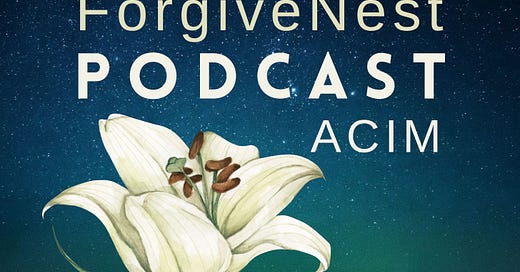




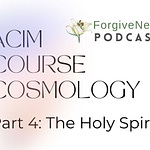
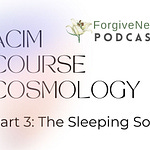
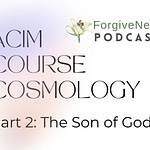
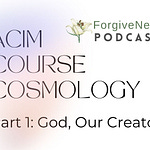
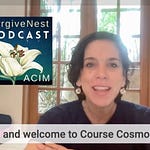
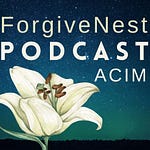
Share this post